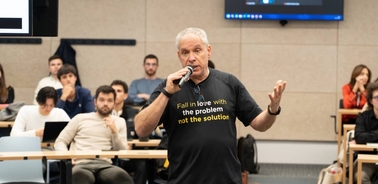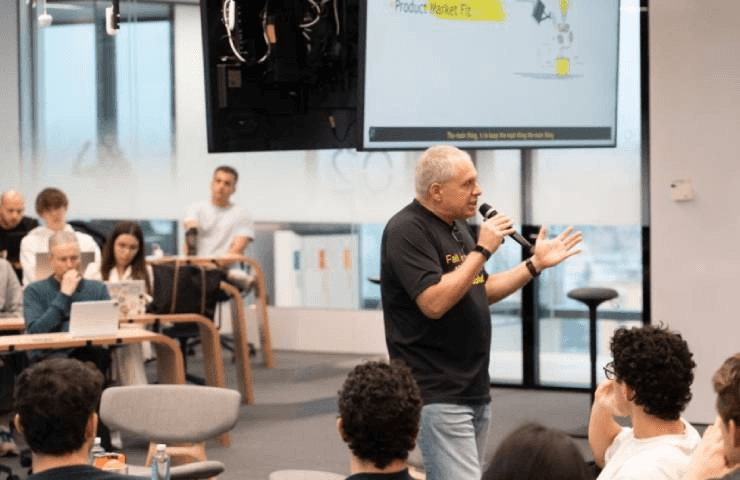Waze Co-Founder Uri Levine Shares Entrepreneurial Wisdom at IE Tech Venture Bootcamp

Masterclass with Uri Levine, kicks off TVB series of expert interviews with program mentors.
One of the standout features of IE School of Sci-Tech’s Tech Venture Bootcamp is the unparalleled mentorship participants receive from industry leaders. Throughout the program, aspiring entrepreneurs gain firsthand insights from expert mentors who have successfully navigated the challenges of building and scaling tech ventures.
Kicking off this year’s Bootcamp with an inspiring masterclass was Uri Levine, co-founder of the navigation app Waze. On day one, Levine shared his entrepreneurial wisdom with participants, setting the tone for an intensive learning experience.
Levine, whose company was acquired by Google for $1.1 billion in 2013, delivered key insights on product-market fit and the long, often difficult journey of building successful technology ventures.
"Product-market fit means that you create value for your customers. If you do not figure out product-market fit, you will die. That's it," Levine told the audience of aspiring entrepreneurs.
The Tech Venture Bootcamp 4th edition brought together IE students, executives, industry visionaries, software developers, entrepreneurs, investors, and researchers. From February 28th to March 3rd students immersed themselves in a series of tech sessions, expert mentorships, and challenging activities aimed at fostering an innovative venture spirit.
Levine served as a mentor for several teams, helping participants transform their projects from ideas to actual tech ventures. Over six days Levine along with the other mentors played an integral role helping the teams solidify their startup plans.
Drawing from his experience with Waze, Levine dispelled common myths about overnight success in the tech industry. "For Waze, it was four years. For Microsoft, it was five years. For Netflix, it was ten years," he explained, highlighting that even companies perceived as instant successes often have years of development behind them. Levine recounted how Waze began in 2007 with a blank map of Tel Aviv, relying entirely on crowdsourced data not just for traffic information but for creating the map itself. "When the first driver drove, we collected the GPS data from their device," he said. As more users joined, patterns emerged that formed a functional map.
The path to success wasn't straightforward. After initial traction in Israel, Waze struggled in international markets. "It was not good enough here in Madrid. It was not good enough in the U.S. It was not good enough anywhere in Western Europe," Levine acknowledged.
The breakthrough came through persistent iteration based on user feedback. "We spoke with them. We asked them, 'What didn't work for you?' And they told us. And we built the next version," he said. After more than a year of iterations, Waze achieved product-market fit, which Levine defines simply: "If you create value, they will come back."
For students looking to build "unicorn" companies, Levine outlined four critical factors: product-market fit, significant market size, a viable business model, and a growth strategy to become a market leader. He cautioned that aligning these elements typically takes at least seven years.
Among his key advice for entrepreneurs: know your users intimately, make mistakes quickly, take bold moves when you have nothing to lose, and don't shy away from making hard decisions, particularly regarding team issues.
Having someone of Uri's caliber share not just success stories but the reality of failure and iteration provided invaluable perspective for the students as they began their entrepreneurial journeys through the Tech Venture Bootcamp.
Stay posted for more TVB Mentor Insights!
